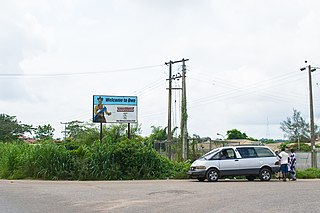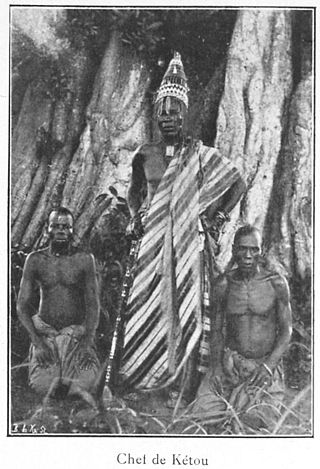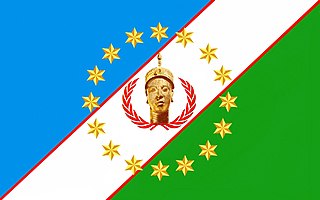
Oduduwa was a Yoruba divine king, legendary founder of the Ife Empire and a creator deity (orisha) in the Yoruba religion. His earthly origins are from the village of Oke Ora According to tradition, he was the holder of the title of the Olofin of Ile-Ife, the Yoruba holy city. He ruled briefly in Ife, and also served as the progenitor of a number of independent royal dynasties in Yorubaland.

The Oyo Empire was a Yoruba empire in West Africa. It was located in present-day southern Benin and western Nigeria. The empire grew to become the largest Yoruba-speaking state through the organizational and administrative efforts of the Yoruba people, trade, as well as the military use of cavalry. The Oyo Empire was one of the most politically important states in Western Africa from the mid-17th to the late 18th century and held sway not only over most of the other kingdoms in Yorubaland, but also over nearby African states, notably the Fon Kingdom of Dahomey in the modern Republic of Benin on its west.
Ketu is the name of a Yoruba subgroup, historical kingdom and region straddling parts of what is now southeastern Republic of Benin and parts of southwest Nigeria. The chief town and traditional capital of the area was the town of Kétou (Kétu), which is considered to be one of the oldest capitals of the Yoruba-speaking people, tracing its establishment to a settlement founded by a descendant of Oduduwa called Sopasan or Soipasan. The Oba of the town were traditionally styled "Alákétu", and are related directly to Ile-Ife in present-day Nigeria. Other towns that were historically part of the Kétu Kingdom are;
The Royal regalia are the attributes of power of the monarchs of the traditional states in Nigeria.

Owo is a local government area in Ondo state, Nigeria. Between 1400 and 1600 CE, it was the capital of a Yoruba city-state. The local government area has a population of 222,262 based on 2006 population census.

Kétou is a Yoruba town, arrondissement, and commune located in the Plateau Department of the Republic of Benin. The commune covers an area of 2183 square kilometres and as of 2013 had a population of 156,497 people, making it the 13th largest settlement in Benin.

The Legends of Africa reflect a wide-ranging series of kings, queens, chiefs and other leaders from across the African continent including Mali, Benin, Ghana, Nigeria, Congo, Ethiopia, Eritrea and South Africa.

The Oba of Lagos, also known as the Eleko of Eko, is the traditional ruler (Oba) of Lagos.
Oba means "ruler" in the Yoruba and Bini languages. Kings in Yorubaland, a region which is in the modern republics of Benin, Nigeria and Togo, make use of it as a pre-nominal honorific. Examples of Yoruba bearers include Oba Ogunwusi of Ile-Ife, Oba Aladelusi of Akure, and Oba Akiolu of Lagos. An example of a Bini bearer is Oba Ewuare II of Benin.

The Yoruba of West Africa are responsible for a distinct artistic tradition in Africa, a tradition that remains vital and influential today.

The following outline is provided as an overview of and topical guide to Benin:

The Yoruba people are a West African ethnic group who mainly inhabit parts of Nigeria, Benin, and Togo. The areas of these countries primarily inhabited by the Yoruba are often collectively referred to as Yorubaland. The Yoruba constitute more than 50 million people in Africa, are over a million outside the continent, and bear further representation among members of the African diaspora. The vast majority of the Yoruba population is today within the country of Nigeria, where they make up 20.7% of the country's population according to Ethnologue estimations, making them one of the largest ethnic groups in Africa. Most Yoruba people speak the Yoruba language, which is the Niger-Congo language with the largest number of native or L1 speakers.
Benin, officially the Republic of Benin, is a country in Western Africa. It borders Togo to the west, Nigeria to the east and Burkina Faso and Niger to the north; its short coastline to the south leads to the Bight of Benin. Its size is just over 110000 km2 with a population of almost 8500000. Its capital is the Yoruba founded city of Porto Novo, but the seat of government is the Fon city of Cotonou. About half the population live below the international poverty line of US$1.25 per day.

The Akure Kingdom is a traditional state with headquarters in Akure, Ondo State, Nigeria. It is the successor to an ancient Yoruba city state of the same name. The ruler bears the title "Deji of Akure".
Iwoye-Ketu is a town primarily located in Imeko Afon, Ogun State in southwest Nigeria with its western portion in Benin. The community shares a border with the Iwajowa local government area of Oyo State on the north. It is renowned for its production of cotton.
Egba Kotan II is the king of the Yoruba State of Dassa in central Benin. The king rose to the throne on March 3, 2002.

The Ekiti people are one of the largest historical subgroups of the larger Yoruba people of West Africa, located in Nigeria. They are classified as a Central Yoruba group, alongside the Ijesha, Igbomina, Yagba and Ifes. Ekiti State is populated exclusively by Ekiti people; however, it is but a segment of the historic territorial domain of Ekiti-speaking groups, which historically included towns in Ondo State such as Akure, Ilara-Mokin, Ijare, and Igbara-oke. Ogbagi, Irun, Ese, Oyin, Igasi, Afin and Eriti in the Akoko region, as well as some towns in Kwara State, are also culturally Ekiti, although belong in other states today.











